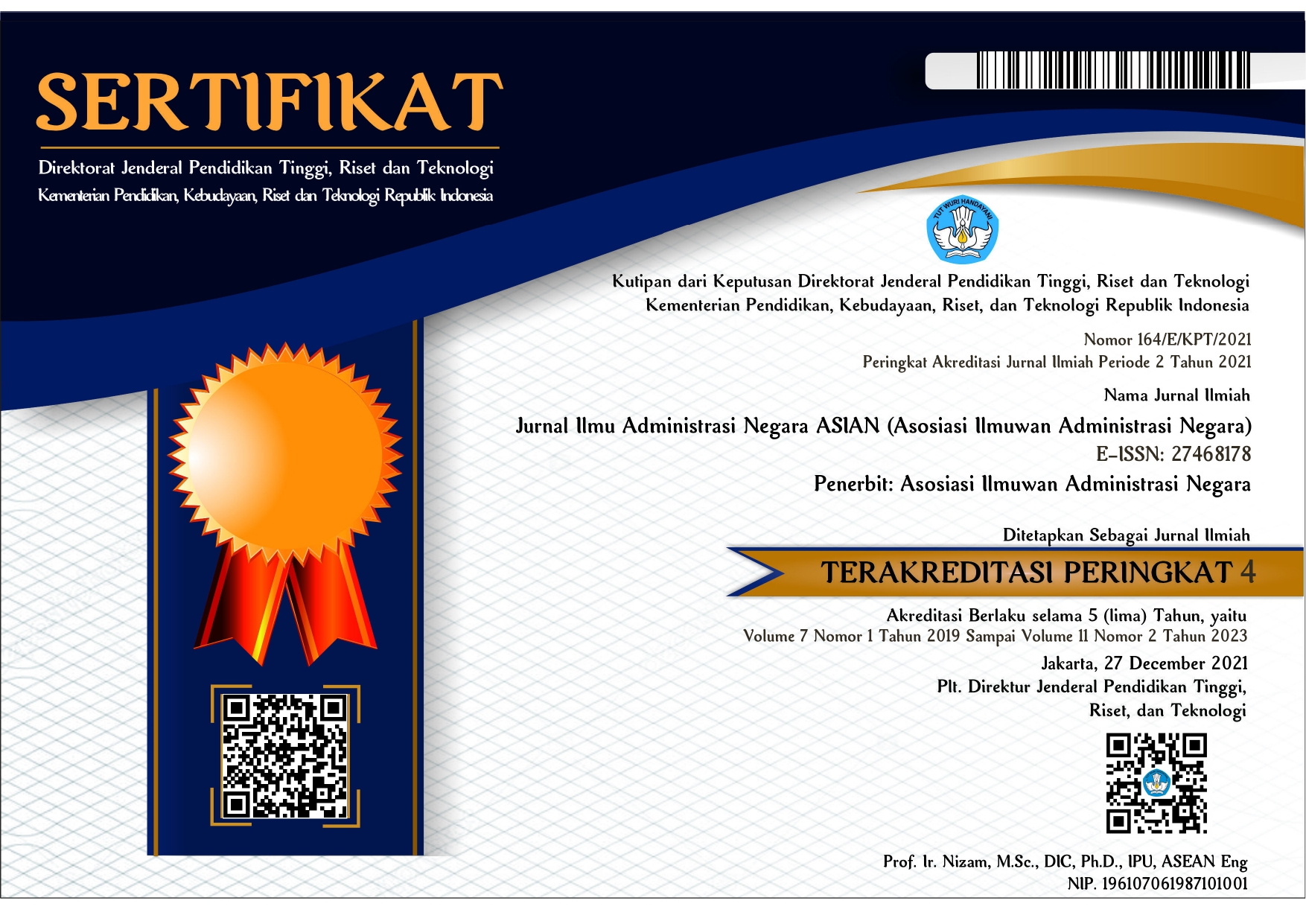Penta Helix Collaboration dalam Pemberantasan Korupsi untuk Mewujudkan Good Governance di Indonesia
 Abstract views: 2100
,
Abstract views: 2100
,
 PDF downloads: 2841
PDF downloads: 2841
Abstract
Eradication of corruption in Indonesia has been pursued through various efforts, but the phenomenon of corruption is still very worrying. One of the efforts is through cooperation between stakeholders so that the eradication of corruption can be carried out more comprehensively from various aspects of life. This study aims to analyze the role and cooperation of stakeholders in eradicating corruption to realize good governance in Indonesia. Secondary data sources are used in this study, in the form of the latest online news, the results of previous research published in reputable journals as well as reports from both government and private entities. The data were analyzed using domain analysis techniques, to get a general picture of the object under study that came from social issues. Based on the Penta Helix approach, it can be seen that stakeholders who play a role in eradicating corruption in Indonesia consist of the Government, Community, Private, Academic, and Mass Media. Although all stakeholders have played a role, this role has not been as expected. Likewise, collaboration between stakeholders has not been carried out optimally. Therefore, a more comprehensive study is needed to increase the role and collaboration among the stakeholders involved.
Downloads
References
Anandya, Diky, Kurnia R. & Lalola E. (2022). Laporan Pemantauan Tren Penindakan
Kasus Korupsi Tahun 2021. Indonesia Corruption Watch.
Anssel, C., & Gash, A. (2007), Collaborative Governance in Theory and Practice, Journal
of Public Administration Research and Theory: pp.543-571
Ardiansyah Fikky, & Pradana, G. W. (2021). kolaborasi Model Pentahelix dalam upaya penanganan bencana wabah Covid-19 di Kabupaten Bojonegoro. Jurnal Publika, 9(4), 545–560.
Brans, M. & Rossbach, S. (1997). The Autopoiesis of Administrative System: Niklas Luhman on Public Administrastion and Public Policy, Public Administration Vol. (75) 417–439
Dwiyanto, A. (2003), Reformasi Tata Pemerintahan dan Otonomi Daerah, Yogyakarta, Pusat Studi Kependudukan dan Kebijakan, Universitas Gadjah Mada
Hendi Sudiantoro, R. G. (2016). Peran Lembaga Swadaya Masyarakat (Lsm) Dalam Pemberantasan Korupsi. Recidive, 5(2), 204–223. https://jurnal.uns.ac.id/recidive/article/view/47774/29724
Kharisma, B. (2014). Good Governance Sebagai Suatu Konsep Dan Mengapa Penting Dalam Sektor Publik Dan Swasta (Suatu Pendekatan Ekonomi Kelembagaan). Buletin Studi Ekonomi, 19(1), 11.
Kismartini, K., Kustarto, I., & Priyadi, B. P. (2019). Analisis Stakeholders dalam Perspektif Governance: Upaya Pencegahan Penyebaran Berita Bohong (Hoax) di Jawa Tengah. November, 21–28. https://doi.org/10.33510/slki.2019.21-28
Maturbongs, E. E. (2020). Kolaborasi Model Pentahelix Dalam Pengembangan Pariwisata Berbasis Kearifan Lokal Di Kabupaten Merauke. Transparansi : Jurnal Ilmiah Ilmu Administrasi, 3(1), 55–63. https://doi.org/10.31334/transparansi.v3i1.866
McAdam, M., Debackere, K., (2017), Beyond ‘triple helix’ toward ‘quadruple helix’ models inregional innovation systems: implication for theory and practice, R & D Management, Vol V: 1-7
Natalia, D. L. (2019). Media Massa dan Pemberitaan Pemberantasan Korupsi di Indonesia. Jurnal Antikorupsi Integritas, 05(2), 57–73. https://jurnal.kpk.go.id/index.php/integritas/article/view/472
Puspito, Nanang T., dkk. (2011). Pendidikan Anti Korupsi untuk Perguruan Tinggi. Jakarta: Kementerian Pendidikan dan Kebudayaan RI.
Saifulloh, P. P. (2017). Peran Perguruan Tinggi Dalam Menumbuhkan Budaya Anti Korupsi Di Indonesia. Jurnal Hukum & Pembangunan, 47(4), 459. https://doi.org/10.21143/.vol47.no4.1591
Setiadi, W. (2018). Korupsi di Indonesia (Penyebab, Bahaya, Hambatan, dan Upaya Pemberantasan, Serta Regulasi. Journal Legislasi Indonesia, Vol 15. No. 3
Sulardi, A., & Erliyana, A. (2021). Kajian Good Governance Singapura dan Indonesia : Studi Pemberantasan Korupsi. Law Review Volume XX, No. 2
TAMPUBOLON, S. M. (2016). Peran Pemerintah Dalam Upaya Pemberantasan Korupsi Kaitannya Dengan Undang-Undang No. 32 Tahun 2004. Lex Et Socieatatis, IV(9), 95–99.
Wang, S. (2014), Research on the Collaborative Governance Model in the Charity Organization under Polycentric Perspective, Open Journal of Social Sciences (2). 263-269
Warsono, H., Febriandini, A. P., Azlansyah, S. A., & Sipayung, A. Z. (2019), Peran Stakeholders dalam Pemberdayaan di Kampung Pelangi, Jurnal Tata Sejuta, Vol.5. No
Wijayanti, A., & Kasim, A. (2022). Collaborative Governance Strategi Nasional Pencegahan Korupsi (Stranas-PK) di Indonesia: Sebuah Studi Literatur. Integritas : Jurnal Antikorupsi, 7(2), 291–310. https://doi.org/10.32697/integritas.v7i2.858
Copyright (c) 2022 Jurnal Ilmu Administrasi Negara ASIAN (Asosiasi Ilmuwan Administrasi Negara)

This work is licensed under a Creative Commons Attribution-ShareAlike 4.0 International License.
Authors who publish with this journal agree to the following terms:
1. Copyright on any article is retained by the author(s).
2. The author grants the journal, right of first publication with the work simultaneously licensed under a Creative Commons Attribution License that allows others to share the work with an acknowledgment of the work’s authorship and initial publication in this journal.
3. Authors are able to enter into separate, additional contractual arrangements for the non-exclusive distribution of the journal’s published version of the work (e.g., post it to an institutional repository or publish it in a book), with an acknowledgment of its initial publication in this journal.
4. Authors are permitted and encouraged to post their work online (e.g., in institutional repositories or on their website) prior to and during the submission process, as it can lead to productive exchanges, as well as earlier and greater citation of published work.
5. The article and any associated published material is distributed under the Creative Commons Attribution-ShareAlike 4.0 International License








